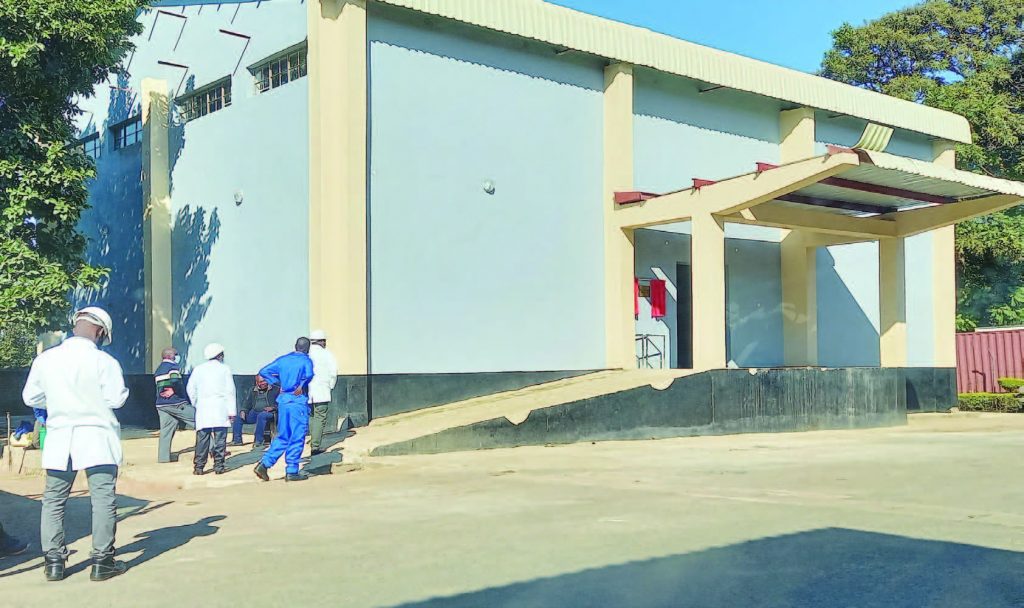Time bomb
- Unregistered firm constructs K330m substandard drug warehouses
- Experts fear buildings could catch fire, danger to medicine
The Ministry of Health contracted a company that the National Constriction Industry Council (NCIC) says is not qualified to carry out construction jobs.

And the firm Sadebeko, which constructed the TB warehouses for the Central Medical Stores Trust (CMST) in Blantyre and Lilongwe, has ended up handing over substandard structures which experts say are at risk of catching fire and is unlikely to keep drugs safe.
Our investigations have found several shortfalls and defects in one of the K330 million warehouses funded by Global Fund through the Ministry of Health’s Project Implementation Unit, including electrical installations, which did not follow the recommended plans of the warehouses.
According to the Blantyre warehouse building plans we have seen, the structure was meant to have 25square millimetre (mm) armoured cable to supply power from the main board into the building. Instead, the contractor tapped power from a nearby toilet using a 2.5mm cable which is making it difficult for the three air conditioners to operate, according to a building expert who was part of the building team.
The warehouse also has no fire alarm panel, no smoke detectors, no ceiling fans, among others, that were on the original plan list, according to the building expert.
He also said the building has no earth rod wire to protect it from lightning or excessive current by tripping the main switch. This means in the event of an electrical fault, the structure is not protected.
The Blantyre building was also supposed to have six air conditioners but only three were installed, but are not working.
NCIC chief executive officer Linda Phiri, in an interview on July 14 2021 said the contractor—Sadebeco—is not registered with NCIC, which automatically disqualified them from being awarded the contract as per the Public Procurement and Disposal of Assets Acts.
Despite the shortfalls, CMST has started using both warehouses following their commissioning by Health Minister Khumbize Kandodo-Chiponda on April 18 this year, who hailed the contractor for doing a “commendable” job.
But an electrical expert, who is a lecturer in electrical engineering, said the 2.5 square mm cables are inadequate for the air cons [of the 24000 BTU] installed at the warehouse.
“This could lead to heating in the cables that could damage the insulation and pose a risk of causing a fire. In addition, air conditioners of this size require separate circuit breakers and properly sized cables.”
He also said lack of proper electrical earthing is a safety hazard to users and is against wiring regulations.
Escom public relations manager Innocent Chitosi said his organisation was not involved in the construction works of the both warehouses.
According to Chitosi, the Lilongwe warehouse was connected directly to CMST electrical network and Escom has not been approached to inspect the network.
“According to CMST officials, the facility has not been handed over to CMST for operations,” contradicting the Ministry of Health spokesperson Adrian Chikumbe who confirmed in an interview the warehouses were commissioned, but described the gaps as minor.
“The ministry is withholding 10 percent of the payment during the contract period. Whatever defects that have been found, the contractor is supposed to make sure that everything else is completed [for them to receive their remaining 10 percent] and the period is one year. So, we are still within the period that they can be called back to perfect whatever is out of order.”
He said construction of the warehouses was hastened to avoid losing funds which would have expired if they were not used on time in line with the donor’s conditions.
“The funds had few months remaining. The conditions with the donor are that if you don’t use the money at a given period, the money [will] be returned, meaning we were going to lose that money.
“As such, we wanted to make sure that we work much faster and that is why one or two things might not have been finished in the best way possible,” said Chikumbe.
On air conditioners, he said they are available but only three were installed.
He claimed the ministry awarded the contract to the company because it submitted document that showed it was registered with NCIC. He also claimed the ministry paid the contractor after the director of buildings certified the works. But in an interview, director of buildings Hastings Chiuzu declined to comment and referred Weekend Nation back to Ministry of Health.
Chikumbe also defended storing drugs in a warehouse without air conditioning, saying there was nothing wrong with it.
“Drugs will be in good condition because they are different from vaccines; vaccines are supposed to be kept in cold houses, maybe minus two degrees celsius,” he added.
But a TB researcher at Kamuzu University of Health Schiences (Kuhes) Titus Divala disputed Chikumbe’s sentiments, saying substandard infrastructure is not advisable for healthcare settings in general and for drug storage facilities in particular.
“While TB drugs are mostly room temperature drugs, maintenance of the temperature below 25 degrees Celsius and the correct measure of humidity is critical.
“And these are achieved by functioning and adequate air conditioning system, adequate air circulation and routine monitoring using thermometers and hygrometers”
Divala also said the ranges of temperature and humidity safeguard the quality of the drugs and hoped the defects in the warehouses would be rectified soon.
For three weeks, the contractor did not respond to our mobile calls but speaking during the official opening, a representative of the company Mkhuzo Bandula Chirwa said they were committed to ensuring that the final product reflects what the owners had in mind.
PHOTOGRAPHS: NATION
Mhango: Our client will suffer permanently





